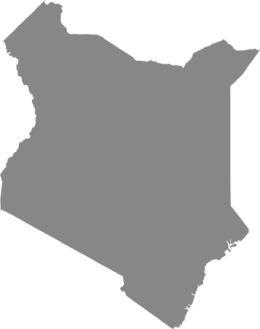In Kenya, Feed the Children works in both urban and rural settings throughout three counties, Turkana, Samburu, and Kajiado. We implement activities in all four areas of our Child-Focused Community Development (CFCD) program areas. This includes meeting immediate and long-term needs of caregivers and their children in areas of food and nutrition, health and water, education, and livelihoods. We use this programmatic approach to meet the needs of each individual community we serve.
We partner with the World Food Programme (WFP) to provide a hot and nutritious meal five days a week during the school year. In 2017, over 136,000 children benefited from our school meals program encouraging the students to attend school each day and help them stay focused on their studies.

Children with stunted growth 26%.
People living below the poverty line 45.9%
Population
48.4 Million
Babies born with low birth weight
8%
Population with access to clean water
71%
Average years of schooling
6.3
Country Profile
While Kenya has a growing entrepreneurial middle class and steady growth, its economic development has been impaired by weak governance and corruption. Although reliable numbers are hard to find, unemployment and under-employment are extremely high and could be near 40% of the population. About 75% of Kenya’s population work at least part-time in the agricultural sector, including livestock and pastoral activities. Over 75% of agricultural output is from small-scale, rain-fed farming or livestock production. Inadequate infrastructure continues to hamper
Kenya’s efforts to improve its annual growth so that it can meaningfully address poverty and unemployment. Kenya experiences recurring drought, and flooding during rainy seasons. Poor infrastructure has led to vast water pollution from urban and industrial wastes; water shortage, and degraded water quality from increased use of pesticides and fertilizers. Kenya’s economy also suffers from rampant deforestation; industry- related soil erosion; massive desertification; and poaching/overhunting of wildlife.
Support Our Programs
We are thrilled at the progress that we have made in improving the nutritional status of children and mothers. We have been able to increase access to education for children who otherwise might not attend school. We have also promoted healthy behaviors through water, sanitation and hygiene training. We are empowering communities to overcome poverty and become self-sustaining. In Kenya, a significant way we are supporting communities to overcome poverty is by promoting Village Savings and Loan (VSL) groups among our beneficiary communities. In many of the communities where we work, banks are either too far away or loan rates are so high that individuals are unable to take advantage of this important service. Without the ability to save or borrow money safely, individuals are unable to make the investments they need to become self-reliant. VSL groups are community-led savings groups comprised primarily of women who pool their resources together and create group savings. Individuals in the group can then take out a loan to start a small business, pay school or medical fees, or further invest in their homes. FEED facilitates initial trainings and provides start-up materials such as a savings box, calculator, and record books for the groups. Would you consider partnering with FEED to continue this important work? Your support enables us to continue implementing livelihoods activities like VSL groups.

